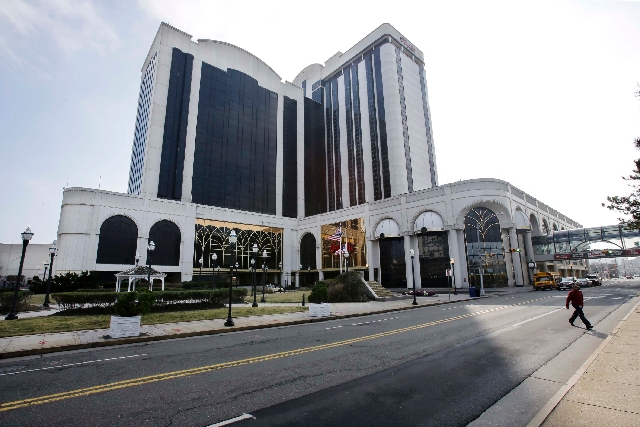Atlantic Club awaits its future

ATLANTIC CITY
On a seasonably pleasant Friday afternoon in late April, Atlantic Club Chief Operating Officer Michael Frawley and PokerStars spokesman Eric Hollreiser acted like cozy business partners.
PokerStars owner Rational Group, which is based in Isle of Man, was moving forward with plans to acquire the aging hotel-casino, considered one of the city’s more unprofitable properties.
Many in Atlantic City rejoiced.
Tourism leaders watched Houston-based Landry’s Inc. spend $150 million last year to transform the failing Trump Marina into the Golden Nugget, which has helped revitalize the city’s Marina District.
Similar visions were expressed for the southern-most casino on the Boardwalk.
The Atlantic Club was built by Steve Wynn in the 1980s and opened as the Golden Nugget. There have been six different ownership groups in the past 26 years.
The property has been known as Bally’s Grand, The Grand, Atlantic City Hilton, and ACH Casino Resort. Colony Capital, the most recent owners, renamed the property the Atlantic Club in February 2012.
Portions of the 801-room resort still contain fixtures, marble flooring and design work dating back to its original construction. On the south side of the largest hotel tower, outlined red lettering that spelled out Hilton is still visible.
Frawley, who has overseen the Atlantic Club since 2008, was upbeat about PokerStars. Rational Group was expected to pump as much as $40 million of improvements into the facility.
The casino was viewed as the eventual home base for PokerStars’ Internet gaming operation under New Jersey’s newly enacted interactive gaming law.
Frawley and Hollreiser didn’t reveal much. The details were being saved for New Jersey gaming regulators, who were reviewing the transaction.
They did, however, point out one large section of the Atlantic Club’s 75,000-square-foot casino floor. The area would become the renovation’s linchpin, a PokerStars-themed poker room.
Hollreiser said the room would be similar to the PokerStars-branded tournament facility at the Grand Waldo Entertainment Complex in Macau, a poker room at the Hippodrome Casino in London, and a planned poker room at the Casino Gran Madrid.
Frawley was equally upbeat. He said PokerStars would make the Atlantic Club the centerpiece of the company’s brand.
Five days later, everything fell apart.
The once chummy relationship has turned into a heads-up game of no-limit hold’em.
On May 1, the Atlantic Club owners canceled the deal, but wouldn’t give a reason.
“Our purchase agreement with PokerStars has been terminated in accordance with its terms,” Frawley said in a statement.
Six days later, The Rational Group went to court in New Jersey and obtained a temporary restraining order barring the Atlantic Club from being sold to another ownership group.
The Rational Group revealed it was planning to pay $15 million for the hotel-casino, far below the $440 million Steve Wynn collected in 1987 when he sold the property to the company that owned Bally’s Las Vegas.
Hollreiser, in a statement, said the Rational Group had already spent
$11 million of the purchase price to fund the casino’s “shortfalls throughout the winter season since October 2012.” And, the Atlantic Club wanted the remaining $4 million as a termination fee.
PokerStars and the Rational Group came into the deal last winter with some hefty baggage. The company paid $731 million to the U.S. Department of Justice last year to settle alleged money laundering, bank fraud and illegal gambling charges surrounding the federal government’s April 2011 crackdown on illegal Internet poker.
PokerStars didn’t admit to any wrongdoing, some of the funds were used to pay money owed to poker players, and the government would not oppose the company’s seeking gaming licenses in legal jurisdictions.
But that didn’t stop the Washington, D.C.-based American Gaming Association from filing a legal brief with New Jersey gaming regulators, saying the PokerStars license application should be rejected because the company had been a “criminal enterprise for many years.”
American Gaming Association CEO Frank Fahrenkopf Jr. declined to comment on the failing PokerStars-Atlantic Club deal during a Monday conference call with reporters covering the organization’s annual State of the States report.
Caesars Entertainment Corp. Senior Vice President Jan Jones wasn’t shy.
During a panel discussion on April 24 at the Global iGaming Summit and Expo in San Francisco, Jones said any company that accepted wagers from American customers following the passage of the 2006 Unlawful Internet Gambling Enforcement Act should be banned from operating in any regulated U.S. market.
Her remarks were targeted at PokerStars.
“If we’re all going to be held to the highest standards, then their position is hogwash,” Jones said last week.
Meanwhile, the Atlantic Club awaits its future.
The Rational Group said its funding kept the casino open and saved 1,800 jobs.
Frawley countered that changes made in the Atlantic Club’s marketing and brand positioning have paid off. The casino targets locals, such as residents of the neighboring South New Jersey towns of Ventnor and Margate.
In March, the Atlantic Club grew gaming revenues 32.7 percent, followed by a 36.6 percent increase in April. For the year, gaming revenues are up 27.1 percent, the highest among Atlantic City’s 12 casinos.
“The trends are proof positive that customers are rediscovering us,” Frawley said.
The question is whether another potential buyer has discovered the Atlantic Club.
Howard Stutz’s Inside Gaming column appears Sundays. He can be reached at hstutz@reviewjournal.com or 702-477-3871. Follow @howardstutz on Twitter.












